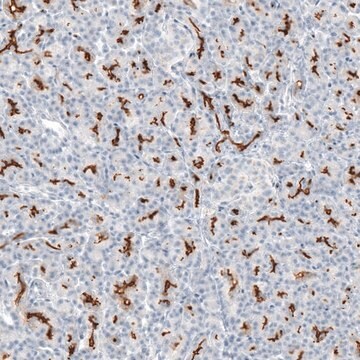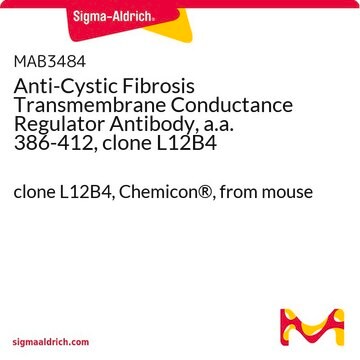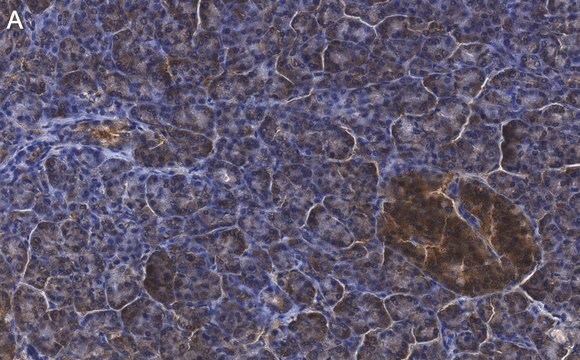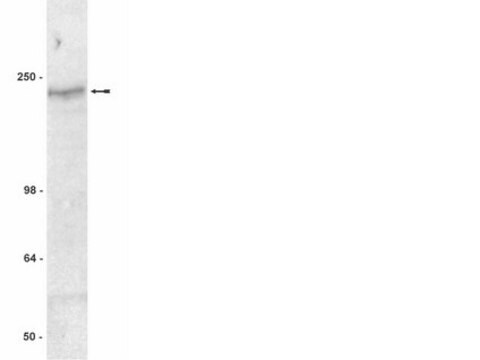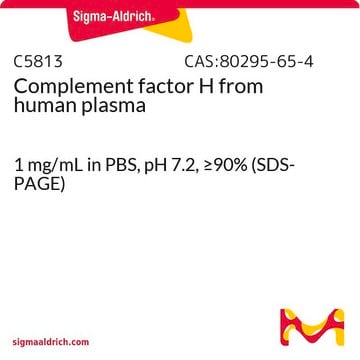05-583
Anti-CFTR Antibody, clone M3A7
clone M3A7, Upstate®, from mouse
동의어(들):
ATP-binding cassette sub-family C, member 7, ATP-binding cassette transporter sub-family C member 7, cAMP-dependent chloride channel, cystic fibrosis transmembrane conductance regulator, cystic fibrosis transmembrane conductance regulator (ATP-binding ca
로그인조직 및 계약 가격 보기
모든 사진(1)
About This Item
UNSPSC 코드:
12352203
eCl@ss:
32160702
NACRES:
NA.41
추천 제품
생물학적 소스
mouse
Quality Level
항체 형태
purified immunoglobulin
항체 생산 유형
primary antibodies
클론
M3A7, monoclonal
종 반응성
human
제조업체/상표
Upstate®
기술
immunohistochemistry: suitable
immunoprecipitation (IP): suitable
western blot: suitable
동형
IgG1
NCBI 수납 번호
UniProt 수납 번호
배송 상태
dry ice
타겟 번역 후 변형
unmodified
유전자 정보
human ... CFTR(1080)
일반 설명
CFTR (Cystic Fibrosis Transmembrane Regulator) is an integral membrane protein shown to be involved in the transport of chloride ions. It is found on the surface of the epithelial cells lining the lungs and other organs. CFTR defects are the cause of cystic fibrosis. Cystic Fibrosis (CF) is a common lethal genetic disease caused by mutations of the gene coding for the cystic fibrosis transmembrane conductance factor, a cAMP regulated chloride channel. Approximately 70% of all CF cases share the deletion of a phenylalanine at position 508 (delta F508), which results in abnormal chloride transport. Since the CF mutation is lethal, most often by lung and liver disease, it raises the question of why this genetic disease remains as common as it is.
특이성
Other species not tested.
This antibody recognizes CFTR, Mr 170 kDa.
면역원
Epitope: a.a. 1365-1395
GST-fusion protein corresponding to residues 1197-1480 of human cystic fibrosis transmembrane conductance regulator (CFTR). The epitope maps within amino acids 1365-1395. Clone M3A7.
애플리케이션
Detect CFTR using this Anti-CFTR Antibody, clone M3A7 validated for use in IH, IP & WB.
Immunoprecipitation:
This antibody has been reported to immunoprecipitate CFTR. (Kartner, N., 1998.)
Immunohistochemistry:
This antibody has been reported to immunostain CFTR in human pancreatic tissue sections. (Kartner, N., 1998.)
This antibody has been reported to immunoprecipitate CFTR. (Kartner, N., 1998.)
Immunohistochemistry:
This antibody has been reported to immunostain CFTR in human pancreatic tissue sections. (Kartner, N., 1998.)
Research Category
Neuroscience
Neuroscience
Research Sub Category
Ion Channels & Transporters
Ion Channels & Transporters
품질
Routinely evaluated by western blot on human T84 colon carcinoma epithelial RIPA cell lysates or from CFTR-transfected BHK2.
Western Blot Analysis:
0.5-2 µg/mL of this lot detected CFTR from 20-50 µg of human T84 colon carcinoma epithelial RIPA cell lysates. 0.5-2 µg/mL of a previous lot detected CFTR from CFTR-transfected BHK (Haardt, M., 1999).
Note: Do not boil the lysate. Instead incubate at 37°C for 30 minutes. CFTR can run as a diffuse protein on SDS-PAGE.
Western Blot Analysis:
0.5-2 µg/mL of this lot detected CFTR from 20-50 µg of human T84 colon carcinoma epithelial RIPA cell lysates. 0.5-2 µg/mL of a previous lot detected CFTR from CFTR-transfected BHK (Haardt, M., 1999).
Note: Do not boil the lysate. Instead incubate at 37°C for 30 minutes. CFTR can run as a diffuse protein on SDS-PAGE.
표적 설명
170 kDa
물리적 형태
Format: Purified
Protein G Purified
Purified mouse monoclonal IgG1 in buffer containing 0.1 M Tris-glycine, pH 7.4, 0.15 M NaCl, 0.05% sodium azide and 30% glycerol.
저장 및 안정성
Stable for 1 year at -20°C from date of receipt.
Handling Recommendations:
Upon receipt, and prior to removing the cap, centrifuge the vial and gently mix the solution. Aliquot into microcentrifuge tubes and store at -20°C. Avoid repeated freeze/thaw cycles, which may damage IgG and affect product performance. Note: Variability in freezer temperatures below -20°C may cause glycerol-containing solutions to become frozen during storage.
Handling Recommendations:
Upon receipt, and prior to removing the cap, centrifuge the vial and gently mix the solution. Aliquot into microcentrifuge tubes and store at -20°C. Avoid repeated freeze/thaw cycles, which may damage IgG and affect product performance. Note: Variability in freezer temperatures below -20°C may cause glycerol-containing solutions to become frozen during storage.
분석 메모
Control
T84 cell lysate.
T84 cell lysate.
기타 정보
Concentration: Please refer to the Certificate of Analysis for the lot-specific concentration.
법적 정보
UPSTATE is a registered trademark of Merck KGaA, Darmstadt, Germany
면책조항
Unless otherwise stated in our catalog or other company documentation accompanying the product(s), our products are intended for research use only and are not to be used for any other purpose, which includes but is not limited to, unauthorized commercial uses, in vitro diagnostic uses, ex vivo or in vivo therapeutic uses or any type of consumption or application to humans or animals.
적합한 제품을 찾을 수 없으신가요?
당사의 제품 선택기 도구.을(를) 시도해 보세요.
Storage Class Code
10 - Combustible liquids
WGK
WGK 1
시험 성적서(COA)
제품의 로트/배치 번호를 입력하여 시험 성적서(COA)을 검색하십시오. 로트 및 배치 번호는 제품 라벨에 있는 ‘로트’ 또는 ‘배치’라는 용어 뒤에서 찾을 수 있습니다.
Mechanosensitive Cl- secretion in biliary epithelium mediated through TMEM16A.
Dutta, AK; Woo, K; Khimji, AK; Kresge, C; Feranchak, AP
American Journal of Physiology: Gastrointestinal and Liver Physiology null
Mark R Woodford et al.
Nature communications, 7, 12037-12037 (2016-06-30)
Heat shock protein-90 (Hsp90) is an essential molecular chaperone in eukaryotes involved in maintaining the stability and activity of numerous signalling proteins, also known as clients. Hsp90 ATPase activity is essential for its chaperone function and it is regulated by
Miquéias Lopes-Pacheco et al.
Chembiochem : a European journal of chemical biology, 17(6), 493-505 (2016-02-13)
We evaluated whether small molecule correctors could rescue four nucleotide-binding domain 1 (NBD1) mutations in the cystic fibrosis transmembrane conductance regulator (CFTR) gene (A455E, S492F, ΔI507, and R560T). We first transfected Cos-7 cells (green monkey kidney cells) with A455E, S492F, ΔI507
Nicoletta Pedemonte et al.
American journal of physiology. Cell physiology, 298(4), C866-C874 (2010-01-08)
Cystic fibrosis (CF) is caused by mutations in the CFTR chloride channel. Deletion of phenylalanine 508 (F508del), the most frequent CF mutation, impairs the maturation and gating of the CFTR protein. Such defects may be corrected in vitro by pharmacological
CFTR mediates apoptotic volume decrease and cell death by controlling glutathione efflux and ROS production in cultured mice proximal tubules.
Sebastien l'Hoste,Abderrahmen Chargui,Radia Belfodil,Elisabeth Corcelle et al.
American Journal of Physiology: Renal Physiology null
자사의 과학자팀은 생명 과학, 재료 과학, 화학 합성, 크로마토그래피, 분석 및 기타 많은 영역을 포함한 모든 과학 분야에 경험이 있습니다..
고객지원팀으로 연락바랍니다.
